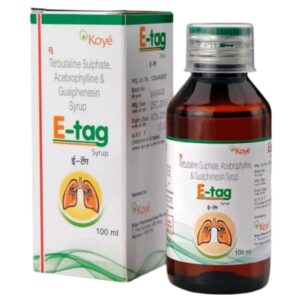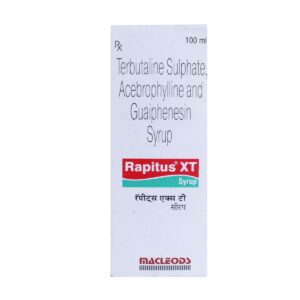GUAIPHENESIN + TERBUTALINE + ACEBROPHYLLINE
Guaiphenesin: Guaifenesin is a medication commonly used to relieve symptoms of respiratory conditions such as coughs, asthma, bronchitis, and congestion. It is classified as an expectorant, meaning it helps to thin and loosen mucus in the airways, making it easier to cough up and clear from the respiratory system.
The exact mechanism of action of guaifenesin is not fully understood. However, it is believed to work by increasing the volume and reducing the viscosity of respiratory tract secretions, which helps to facilitate the removal of mucus.
Guaifenesin is typically taken orally in the form of tablets, capsules, or liquid. The usual adult dose is 200-400 mg every 4 to 6 hours, with a maximum daily dose of 2.4 grams. It is important to follow the instructions provided by your healthcare provider or the product label.
Common side effects of guaifenesin may include nausea, vomiting, stomach upset, dizziness, headache, and rash. These side effects are usually mild and resolve on their own. However, if you experience any severe or persistent side effects, it is important to consult your healthcare provider.
It is worth noting that guaifenesin might interact with certain medications, so it is essential to inform your healthcare provider about all the medications you are taking, including prescription and over-the-counter drugs, as well as any herbal supplements or vitamins.
As with any medication, it is important to use guaifenesin only as directed and consult your healthcare provider if your symptoms worsen or do not improve after several days of treatment.
Terbutaline: Terbutaline is a medication commonly used as a bronchodilator to treat conditions such as asthma, chronic obstructive pulmonary disease (COPD), and bronchospasms. It belongs to a class of drugs called beta-2 adrenergic agonists, which work by relaxing the smooth muscles in the airways, allowing them to widen and improve airflow.
Terbutaline is available in various forms, including oral tablets, inhalers, and injections. The appropriate form and dose will depend on the specific condition being treated. It is typically used as a rescue medication in cases of acute bronchospasm or as a maintenance treatment for chronic conditions.
The usual recommended dose of terbutaline may vary, but for oral tablets, the typical range is 2.5 to 5 mg taken every 6 to 8 hours, with a maximum daily dose of 15 mg. For inhalers, the recommended dose is usually 1 to 2 inhalations every 4 to 6 hours, as needed. The specific dosing instructions should be followed as directed by a healthcare professional.
Like any medication, terbutaline may cause certain side effects. Common side effects may include tremors, headache, nervousness, dizziness, increased heart rate, palpitations, nausea, muscle cramps, and difficulty sleeping (insomnia). These side effects are generally mild and may subside with continued use or after a dose adjustment. However, if any of these side effects persist or worsen, it is important to consult a healthcare provider.
In some cases, terbutaline may also cause more serious side effects, although these are rare. These include chest pain, irregular heartbeat, severe dizziness, difficulty breathing, allergic reactions (such as rash, itching, swelling, or severe dizziness), and high blood sugar. If any of these severe side effects occur, immediate medical attention should be sought.
It is important to note that terbutaline is not suitable for everyone. Individuals with certain medical conditions, such as heart problems, high blood pressure, diabetes, hyperthyroidism, or an allergy to terbutaline, should not use this medication. Additionally, terbutaline should be used with caution in pregnant women, as it may have effects on the developing fetus.
In conclusion, terbutaline is a widely used bronchodilator medication used to treat conditions such as asthma and COPD. It works by relaxing the muscles in the airways, improving airflow. The dose and form of terbutaline will depend on the specific condition being treated, and it can cause both common and rare side effects. It is important to follow the prescribed dosage and seek medical attention if any severe side effects occur.
Acebrophylline: Acebrophylline is a drug that is commonly used for the treatment of respiratory conditions such as chronic obstructive pulmonary disease (COPD), bronchial asthma, and other lung diseases. It is classified as a bronchodilator and mucolytic agent.
The mechanism of action of Acebrophylline involves two main components. Firstly, it acts as a bronchodilator, which means it relaxes the smooth muscles of the airways, resulting in widened air passages and improved airflow. Secondly, it acts as a mucolytic agent, which helps to thin and loosen the mucus in the airways, making it easier to cough up and clear the lungs.
The usual recommended dose of Acebrophylline for adults is 100 mg orally twice daily. However, the dosage may vary depending on the individual patient’s condition and the prescribing physician’s instructions. It is generally advised to take the medication after meals to minimize potential gastrointestinal side effects.
Like any medication, Acebrophylline may have potential side effects. The most commonly reported side effects include gastrointestinal symptoms such as nausea, vomiting, stomach pain, and diarrhea. Some individuals may also experience headaches, dizziness, palpitations, and increased heart rate. Allergic reactions such as skin rash or itching may occur in rare cases. If any severe or persistent side effects occur, it is important to consult a healthcare professional immediately.
It is important to note that Acebrophylline should only be used under the guidance and prescription of a healthcare professional. They will assess the individual’s medical condition, consider any drug interactions, and provide specific instructions regarding the appropriate dosage and duration of treatment.


